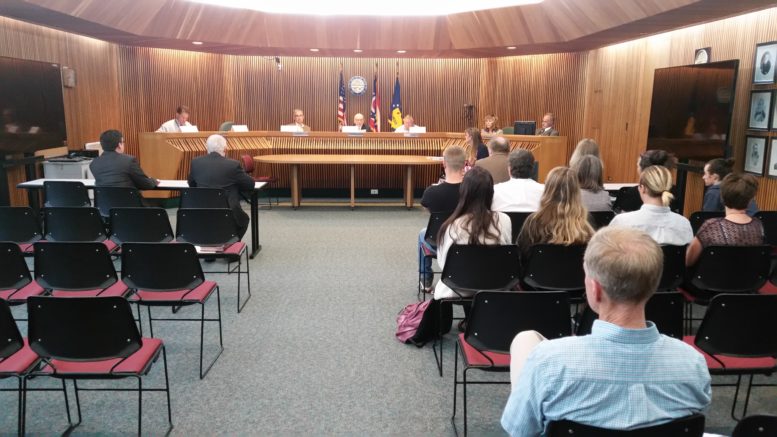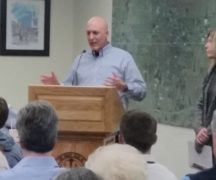By JAN LARSON McLAUGHLIN
BG Independent News
The legal battle to get an anti-pipeline charter amendment on Bowling Green’s ballot has come down to two sides – those who want to stop the pipeline and those who would want the jobs building it.
On Thursday morning, the petition submitted by citizen activists worried about the effect of Nexus pipeline on the city’s water plant was challenged by a Bowling Green man who is a member of the local plumber-pipefitter union.
The Wood County Board of Elections took information from both sides and will come back with a decision.
Last week, the Wood County Board of Elections voted to allow the November ballot to include the controversial charter amendment.
However, then a Bowling Green resident, David W. Espen, filed a protest with the board of elections about the charter amendment. Espen was not present at Thursday’s hearing, but was represented by the Columbus law firm McTigue & Colombo.
Espen’s objections cite two possible problems with the charter amendment petition – one questioning the number of valid signatures, and the other questioning the authority of the city to grant the power requested in the petition.
The complaint zeroed in on five specific signatures. Normally, that might not matter if a handful of signatures were found to be invalid. However, the pipeline petition had only one more signature than required to appear on the ballot. A total of 1,230 signatures were collected on the petition. By law, to make it on the ballot, the petition needed 714 valid signatures. It had 715.
The five signatures in question are from Bowling Green State University students who live on campus and therefore have dual addresses of their residence halls and of street addresses.
Terry Burton, of the Wood County Board of Elections, testified that the board cross checks street addresses and dorm addresses, and allows either for students when they register and cast ballots during elections. The Ohio Secretary of State appears to support this process, according to Terry Lodge, attorney for the citizens behind the petition.
However, Donald McTigue disagreed.
“The law requires you to put down your street address,” not university residence hall, McTigue said after the hearing. “The law clearly requires that they have the legal street address.”
On the second challenge, McTigue said the charter amendment exceeds the city’s role allowed in the Ohio Constitution. The protest claims the issue goes beyond the limits permitted to municipalities.
Lodge said the Wood County Board of Elections already considered the constitutionality argument, and decided the issue should go on the ballot for voters to decide.
Last week, the board of elections voted with three in favor of the charter amendment being placed on the ballots. John Cuckler, Dick Newlove and Mike Zickar voted in favor, while Mike Marsh recused himself since he is the city attorney for Bowling Green.
“This board has traditionally, philosophically had a tendency to put things on the ballot and not keep them off,” Newlove said prior to last week’s vote.
But McTigue said it’s the board of elections’ responsibility to determine the constitutionality of an issue – not to leave it up to the voters.
“I think we made a very forceful argument that this goes well beyond municipal power,” he said. “It’s their responsibility. The law here is clear.”
Lodge pointed out in a letter to the board of elections, that Espen had plenty of time to file his objections prior to the board’s initial hearing on the matter. The board of elections’ ruling should stand, Lodge urged.
Burton said the board will make a decision as soon as possible, since the issue is proposed for the November ballot. If the decision on this challenge is appealed, the issue will go straight to the Ohio Supreme Court, Burton said.
“The Charter Amendment belongs on the ballot,” citizen activist Lisa Kochheiser said after the latest challenge was filed.
Prior to last week’s decision, Kochheiser urged the board to let Bowling Green citizens vote on the issue.
“I speak for the people of Bowling Green who want to protect their community from corporations, like Nexus pipeline,” Kochheiser said.
Kochheiser said the charter amendment gives city residents a right to “peacefully enforce these rights.” That means, according to Kochheiser, giving people the right to hold sit-ins or put up blockades on roads to prevent deliveries.
“We’re talking about peaceful demonstration kind of stuff,” she said. “To try to stand up for our rights.”





